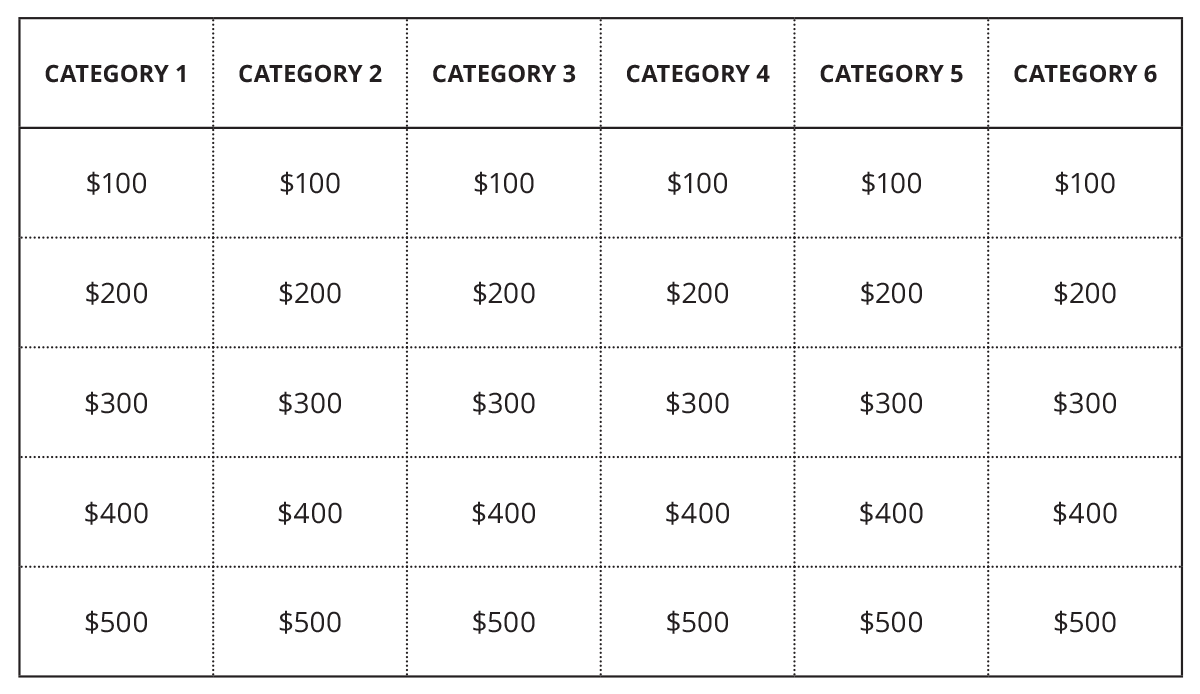On November 8, 2020, Canadian game show host Alex Trebek died at home at the age of 80 after a battle with pancreatic cancer. Amazingly, Trebek kept filming his popular trivia game show, Jeopardy!, right until the end of his life (the final episode will air December 25, 2020). Trebek set a Guinness World Record for the most game show episodes ever hosted—more than 8,000 in all! In the words of Prime Minister Justin Trudeau, "the world lost an icon."
Jeopardy! had a great impact on both my personal and professional life. I grew up watching Jeopardy! every night after dinner—it was one of my dad's favorite shows. The show's concept, along with Alex Trebek's friendly, encouraging manner, instilled a love of learning in me from a young age.
Professionally, I often used the game show's format to create review activities in my ESL classrooms. My students loved the challenge of the progressively more difficult questions and looked forward to competing for imaginary money. I used Jeopardy! for vocabulary review most often, but I also adapted it for grammar review and used it as a general trivia game that my students enjoyed. I even had my students create their own Jeopardy! boards.
Many North American immigrants claim to have learned English by watching Jeopardy!, including Kristyna Ng and Burt Thakur who both made it onto the quiz show to tell their language-learning stories.
If you are interested in trying Jeopardy! with your students, follow the steps below.
How to Play Jeopardy!
1. Choose the categories and words you wish to review.
- For a vocabulary review activity, you can choose the titles of six lessons you've done during the past month for your categories and five words you wish to review from each lesson for the dollar amounts.
- Another idea is to choose common categories such as People, Places, Food, Weather, Animals, and Sports to create a general knowledge review.
2. Copy the following table onto the board, or share it in an online teaching platform.
- If you want to review fewer words, choose fewer categories (e.g., for a total of 15 words to review, have three categories with five words in each).
- You can also google "Jeopardy board" to find various other boards to share in class or online.

3. Prepare the vocabulary words and definitions in a master list ahead of time that you can refer to.
- To mimic the real Jeopardy! game, the words/definitions should progress in order of difficulty, with $100 being the easiest and $500 being the most difficult.
- If you're reviewing ESL Library lessons you've done in class, simply open the PDF or Task Player of a lesson and make a list. For example, if Category 1 is a review of Climate Change vocabulary, your list might look like this:
- $100 undeniable = unable to be denied
- $200 greenhouse gas = a type of gas that contributes to the trapping of heat in the earth's atmosphere
- $300 carbon footprint = the amount of greenhouse gases contributed by a single person or group
- etc.
- If you're playing a general knowledge game, you can find plenty of vocabulary words and definitions within our Famous People, Famous Places, Famous Things, and Sports & Leisure lessons.
- Alternatively, have students create their own list of words and definitions based on past lessons or categories, words, and definitions that they write themselves.
4. Start the game!
- Divide the class into two (or more) teams.
- One student from Team A starts the play by choosing a category and an amount.
- Read the definition from your master list associated with that category and dollar amount.
- If that student responds with the correct vocabulary word for that definition, they collect the dollar value of that square.
- To make it more authentic, have your students answer Jeopardy!-style, where each answer begins with "What is..."
- If that student from Team A answers incorrectly, someone from Team B can steal the money by answering correctly. If neither team can answer correctly, you can reveal the correct answer and no one gets the money from that square.
- Continue the game with a student from Team B. Continue gameplay with the teams taking turns until they've gone through every square.
- The team with the most money at the end of the game wins!
Related
- Alex Trebek Remembered: English with the Washington Post (Adv)
- Alex Trebek Remembered (Int – High Int)
- Alex Trebek Remembered (Low Int – Int)
- 4 Ways to Teach New Vocabulary
- 4 Activities for Reviewing Vocabulary.

